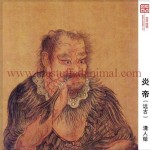Huangdi and Yandi were the common ancestors of the Chinese nation, and Chinese people at home and abroad all call themselves “descendents of Yandi and Huangdi”.
As recorded in legends and ancient books, Huangdi was the first emperor in Chinese history. His surname was Ji, and his assumed name Xuanyuan Shi or Youxiong Shi. Yandi was also a legendary ruler whose surname was Jiang and assumed name Lieshan Shi or Shennong Shi.
Huangdi and Yandi both lived in the late period of China’s primitive society about 4,000 years ago, and were the leaders of two different tribes living along the Yellow River in present-day Shaanxi Province. Later, they expanded their territories along both sides of the Yellow River to the east. The Yandi had invaded the territory of another tribe, the Jiuli, whose leader was Chiyou. The result was a defeat for the Yandi, who then sought help from the Huangdi tribe, and together they defeated Chiyou. After the defeat, some people of the Jiuli fled to the south, while others were assimilated into the Yandi or Huangdi tribes. The alliance did not last and eventually, fighting broke out that led to the Huangdi defeating the Yandi, whose members were forced to join and thus further strengthen the power of the Huangdi tribe. Later, segments of the three tribes (Huangdi, Yandi and Jiuli) settled down in the Yellow River valley, where they began to develop China’s ancient culture and eventually formed the mainstay of what we know today as the Chinese people. It is from this time that people began to call themselves “the descendents of Yandi and Huangdi”
Huangdi was born clever. After he became the tribal leader, he taught people how to build houses, breed livestock and grow food crops, and invented the cart, boat, musical instrument and written characters. His wife, Leizu, discovered how to breed silkworms, how to reel off raw silk from cocoons, and how to brocade. Yandi, meanwhile, invented various farm implements and taught his people how to engage in agricultural production. He tasted all kinds of plants and discovered various medicinal materials for treating diseases. At present, there are still preserved the Mausoleum and the Temple of the Yellow Emperor on Qiaoshan Mountain planted with evergreen pines and cypresses in Huangling County, Shaanxi Province. And in Yanling County, Hunan Province, the Mausoleum of the Red Emperor is also well preserved. Later generations greatly cherished their memory.









发布产品咨询